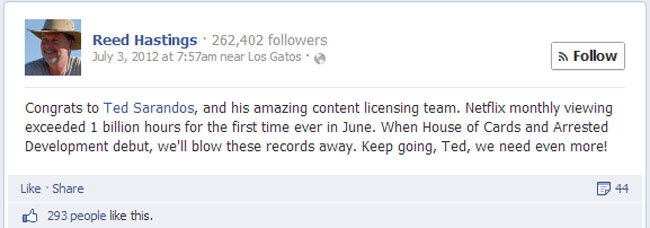
When Netflix experienced an all-time monthly viewing high of over a billion hours worth back in July 2012, CEO Reed Hastings couldn’t help but tell Facebook about his company’s stellar progress (see above). This, unfortunately, was not well received by some – last December, the U.S. Securities and Exchange Commission (SEC) filed a civil action lawsuit against him, stating that he provided “material investor information” to a select few (if you can call 262,402 Facebook followers a select few) instead of publicly announcing it via an 8-K filing or press release. Today, they came out with a ruling: Facebook, along with other social media outlets, is now considered neutral ground and can be used as an avenue by corporations to spread information.
Why was Netflix flagged in the first place? The company’s stock skyrocketed right after Hastings’ Facebook post, causing many to wonder if using social media to divulge company performance is fair and legal. In the SEC’s Report of Investigation, the office stated that they found no reason to “pursue an enforcement action” against Hastings.
Netflix has been experiencing a lot of successes as of late – one in every four homes in the U.S. has a regular subscription to the service. House of Cards – a political drama series that garnered rave reviews – is the first product of Netflix’s original programming initiative, and it hopes to produce at least four more this year. SEC’s ruling basically gives Netflix – and other growing companies – the go-ahead on moving forward, using blogging and various forms of social media to engage with their members and the rest of the Internet public. CEOs no longer have to think (as much) before tweeting and updating their Facebook statuses.
Of course, with great social media power comes great responsibility. In a press release announcing the conclusion of their investigation against Hastings, SEC stipulated that as long as investors are given a proper heads up regarding important company updates about to be released on the Web, it should be perfectly all right to use social media as an advantage for faster information dissemination.
Editors' Recommendations
- What does a check mark mean on Facebook Messenger?
- How to create multiple profiles on a Facebook account
- Twitter Blue is losing Ad Free Articles and Musk’s latest tweets indicate further changes
- Reels are about to show up in yet another Facebook feature
- What is a Facebook Pixel? Meta’s tracking tool, explained

